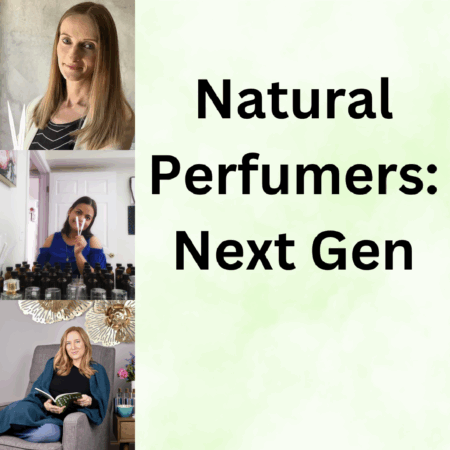
Recently on Instagram, a well-known master perfumer said natural perfumes are “boring”. It is not the first time I heard that statement. A perfume critic used a disparaging word to describe natural perfumery 15 years ago. We have had a dedicated Natural Perfumery Editor from our inception (Ida Meister for most our 15 years). In this article we will meet three Next Gen natural perfumers who choose to work with a 100 percent botanical palette: Gabrielle Durand of On The Nose Perfumes (who is also a ÇaFleureBon contributor for Notes from the Lab), Whitney Swales of Wit & West Perfumes and Livvy (Olivia) Larsen of La Fleur by Livvy. Boring? Hardly. Each of their responses to my questions are as memorable as their perfumes. –Michelyn Camen, Editor-in-Chief
Hello Natural Perfumers! Please introduce yourselves !
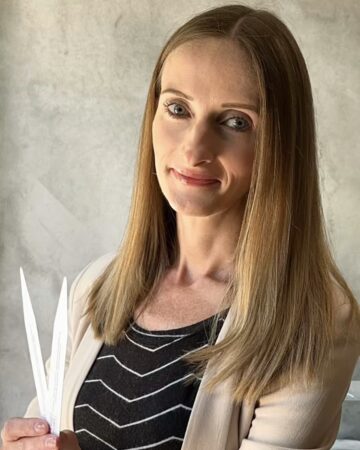
Whitney Swales of Wit &West: My name is Whitney Swales (“Wit”), and I am the perfumer and co-founder along with my husband Rob (“West” is short for his last name, Westendorf) for Wit & West Perfumes, an indie artisan natural perfumery based in Colorado.
Olivia Larsen of La Fleur de Livvy: Hi there, I’m Olivia Larson (aka Livvy), founder, creative director and nose behind an all-natural perfume house called La Fleur by Livvy. My perfume studio is in Grand Junction on the western slope of Colorado.
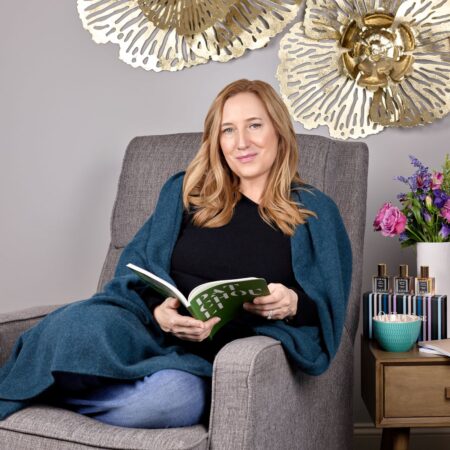
Gabrielle Durand of On The Nose Perfumes
Gabrielle Durand: I’m Gabrielle Durand, the founder and perfumer behind On The Nose Perfumes, a U.S.-based natural fragrance house that launched in November 2024. I create small-batch, all-natural perfumes using the highest quality botanical materials I can source. I offer a core collection, bespoke fragrances, and educational content through my blog.
Which came first, becoming a perfumer or a natural perfumer?
Gabrielle Durand: Becoming a perfumer came first, but I didn’t stay in that lane for long. I studied mixed-media perfumery through the Institute for Art & Olfaction’s 2020 Summer Intensive and spent the next year and a half experimenting. When I formulated my first natural solid perfume, everything changed, and I haven’t looked back.
Whitney Swales: The idea of becoming a perfumer came first, but I gravitated toward natural perfumery
Olivia Larsen: Becoming a natural perfumer made sense, because at a very early age I was exploring a variety of scents such as exotic flowers, herbs and spices, trees, summer scorched florals and damp earth after the monsoon rains, leather at local tanneries etc. I grew up in the Indian subcontinent, in Calcutta and a lot of these scents/smells have created an olfactive memory for me. It was later that I realized I had a passion for perfumery and focused on natural perfumery.
How long have you been a natural perfumer?
Whitney Swales: Officially (based on when we launched Wit & West), almost 5 years.
Olivia Larsen: I have been a natural perfumer since the onset of my perfume brand in 2013.
Gabrielle Durand: I’ve been working exclusively with natural materials since late 2021. My transition began earlier, overlapping with my mixed-media work and evolving through years of training, research, and experimentation.
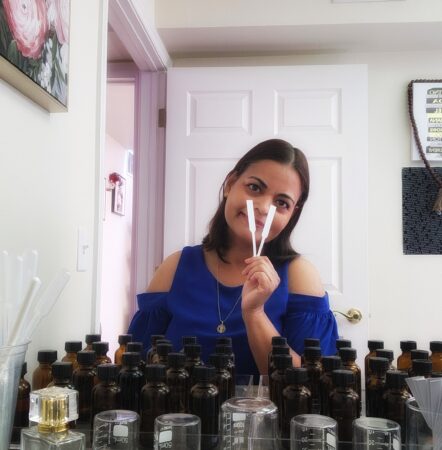
Livvy (Olivia) Larsen of La Fleur by Livvy
What was the motivation?
Olivia Larsen: I have always been drawn towards flowers and plants. I am simply fascinated by the various aromas that the plant kingdom offers us including their healing aspects as well, not to mention their colors, textures and shapes. When I first discovered essential oils and started blending, I found pure joy in creating perfumes that made others feel happy and nostalgic. Also, my sensitivity towards synthetics in mainstream perfumes drew me to create my own.
Gabrielle Durand: It was visceral; something about the natural raw materials spoke to me in a way synthetics never had. The first time I created a fully natural perfume, I was completely captivated. That one project shifted my entire direction.
Whitney Swales: In the same way that classic rock, jazz, blues, pop, and EDM are all genres of music, I view natural perfumery as a genre or style of perfumery. I choose to use natural ingredients as an artistic choice and appreciation for the medium.
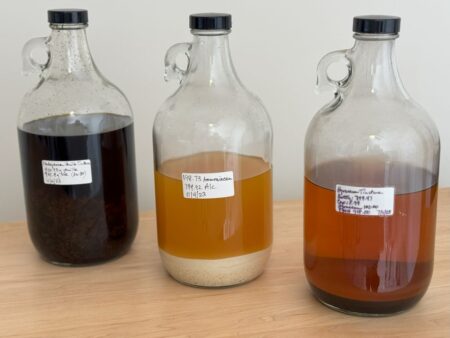
Hand made tinctures by Gabrielle Durand
Do you feel limited by using only natural ingredients?
Gabrielle Durand: There are some technical effects that naturals alone can’t achieve and the palette is smaller. But I see that as a creative challenge, not a drawback. Natural isolates, new extraction techniques, and variations in terroir, varietals, and processing methods all help to keep things dynamic and exciting.
Whitney Swales Yes and no. I love working with natural ingredients. While they can be challenging and sometimes finicky, I love a good challenge. I may not have access to certain aroma molecules typically used to create specific effects, but I’ve learned to work with naturals in creative ways to achieve similar or even unique and unexpected results.
Olivia Larsen: No, I do not feel any limitations because the combinations are endless. Accordingly, to the Royal Botanic Gardens there are approx. 391,000 known plant species on Earth. Perfumery is an artform where we can express ourselves and I prefer to use a natural palette vs a synthetic one.
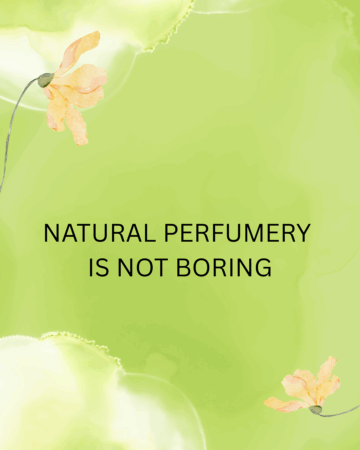
Let’s tackle the “natural perfumery” is boring statements. Why are they wrong?
Whitney Swales: I don’t think natural perfume is boring, it’s just different. It’s like the difference between the acoustic and electric guitar; the sound of the acoustic guitar is raw, natural, and intimate, while the electric guitar offers a range of amplified tones and effects. Both acoustic and electric guitar offer unique experiences, just as different styles of perfumery can. To me, regardless of whether they are all-natural, non-natural, or somewhere in between, all types of perfume can offer a different experience depending on your mood, the season, or occasion.
Gabrielle Durand: If natural perfumery feels boring, you might not be smelling the right perfumes. Naturals have depth, story, and soul and they evolve over time and behave differently on each wearer. That unpredictability is part of the magic.
Olivia Larsen: Speaking from experience and crafting natural perfume is far more complex than most people realize because you are using ingredients that are intricate mixtures of many aroma compounds where you blend essential oils, resins, extracts and tinctures that are aged over long periods of time, when this macerate together it creates hundreds of aroma compounds. Imagine the depth and complexity? For example, a real rose or jasmine has a multifaceted scent unlike a synthetic rose or jasmine created often from a few molecules. I find this entire process completely fascinating and boring never crosses my mind.
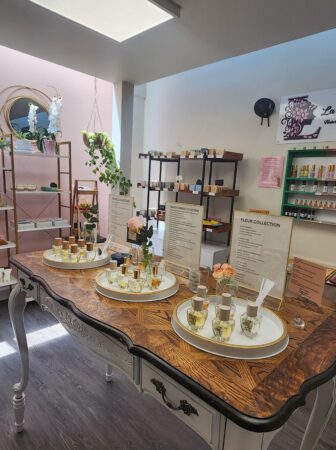
Olivia Larsen’s studio
Why do some perfumers and consumers discredit natural perfumers and natural perfumery? Some say its Aromatherapy and not real perfume.
Olivia Larsen: Natural perfumery isn’t as revolutionized as the Beauty industry is with clean ingredients. There is a bit of misconception about sustainability and safety with naturals due to allergens, however, there are a lot more harmful ingredients in synthetic perfumes to be considered. Natural perfumes typically don’t release harmful VOCs that negatively impact health and the environment. From that perspective, they may be a safer choice than synthetics and are not mass produced from cheaper ingredients.
Whitney Swales: I think there are a few reasons for this. First, natural perfumery is not mainstream, so it feels less familiar and accessible. Second, people often confuse it with aromatherapy, even though natural perfumers build fragrances much like mixed‑media perfumers, creating accords from essential oils, absolutes, CO₂ extracts, and natural isolates. Lastly, some assume we dismiss synthetics or think naturals are inherently safer. While I work exclusively with naturals, I appreciate all styles of perfumery and never claim natural equates to being safer, because it doesn’t.
How do you source your botanical ingredients?
Gabrielle Durand: Sourcing is one of my favorite parts of the process. I work primarily with trusted suppliers who specialize in natural perfume ingredients, and sometimes directly with small producers. I also make my own tinctures to expand my palette and deepen my connection to the materials.
Whitney Swales: While we love sourcing new and rare natural ingredients, Rob and I are committed to ethical and sustainable sourcing. We work with suppliers who provide traceability and transparency around ingredient origin, farming, and cultivation practices. For threatened or vulnerable species, we seek alternative sources or use similar natural or naturally derived ingredients.
Olivia Larsen: By researching raw ingredients, fair market and sustainability, ethical sourcing and extraction methods and finding the right suppliers both locally and globally to support our needs. We are buying oils in smaller quantities, growing our own flowers and botanicals, purchasing from local farmers and markets, reducing our carbon footprint by also supporting them.

Wit & West Iris for Enfleurage grown in her garden
Do you have proprietary techniques?
Whitney Swales: Yes. For our limited-edition perfumes in the Wit & West Reserve Collection, we use rare natural ingredients along with in-house materials like our Tahitian vanilla tincture and enfleurage extraits made from flowers grown in the Wit & West garden
Gabrielle Durand: I’ve developed a creative process that supports consistent exploration within a natural palette. I also use specific methods to enhance longevity without compromising the integrity of natural materials. For bespoke clients, I created a written guide that helps them communicate their preferences clearly.
Olivia Larsen: I primarily blend my perfumes using botanical raw ingredients with essential oils, absolutes, waxes, resins, I make my own tinctures and extracts from fruits and roots. I recently created a perfume from basmati rice that I tinctured, which is called Onam (happiness in Sanskrit) and was a Finalist at the recent IPF Awards at the Barcelona Perfumery Congress.
Who are your mentors?
Gabriel Durand: I don’t have one formal mentor, but I’ve learned so much from Isabelle Gelle-Marchand, Mandy Aftel, Karen Gilbert, Sarah McCartney, Charna Ethier, and others. Isabelle’s two-year diploma program at the Perfumery Art School U.K. gave me structure and confidence, and I remain active in her school community. My colleague in this essay, Whitney Swales has also shared great insights about running a natural perfume brand.
Olivia Larsen: Creezy Courtoy IPF founder, focusing on bringing back flowers into perfumery, Francoise Rapp, who taught me and many other fellow natural perfumers and grateful for their friendships. I admire Mandy Aftel a pioneer in natural perfumery and would be honored to study under her one day. Last but not least, I admire and respect Michelyn Camen, Editor-in-Chief, CaFleureBon and her team who always put a spotlight on natural perfumers.
Whitney Swales: I’ve had several mentors throughout my life, both before and after becoming a perfumer. One is a former colleague from my corporate career who continues to inspire me. I also consider my good friend and fragrance blogger Damiana Chiavolini, and Charna Ethier, perfumer and founder of Providence Perfume Co., to be mentors as well.
A hot topic these days is the proliferation of dupes. Let’s talk about that as it relates to Natural Perfumery
Can natural perfumes be duped?
Gabrielle Durand: It’s possible, but far more difficult than duping a mixed-media perfume. While GC/MS analysis can be run on a natural perfume, the complexity of natural materials makes the results harder to interpret. You might get close using only naturals, but you’re likely to miss some of the layered detail and character that give the original its depth
Whitney Swales A natural perfume could be duped, but I don’t think it’s something that’s common or likely to become widespread anytime soon. One reason is that dupes typically come with a lower price tag, which is difficult to achieve when working with natural ingredients. Another reason is that even with GC/MS analysis, it’s hard to determine the exact ingredients used or where they were sourced from.
How has natural perfumery changed over the past decade?
Olivia Larsen: Natural Perfumery has moved from simple essential oil blends to a strong commitment to sustainability and ethics, a focus on transparency, and a deeper understanding of the functional benefits of natural aromatic compounds. Consumers are increasingly seeing natural perfumes as tools for emotional well-being and self-care.
Whitney Swales: Natural perfumery has evolved over the past decade due to growing consumer interest in natural ingredients in areas like food, consumer, and beauty products. Even in the five years I’ve been practicing, I’ve seen an expansion in ingredient options (which is exciting!). New natural isolates, upcycled ingredients, and the increased availability of CO₂ extracts that were once only offered as essential oils or absolutes.
Gabrielle Durand: Even in the past five years (the time I’ve been involved in the fragrance world), natural perfumery has gained visibility and momentum. New extraction techniques and increased access to high-quality materials have helped expand what’s possible. More perfumers and consumers now see naturals as complex, creative tools rather than just niche or aromatherapy-adjacent.
For our Natural Perfumers Giveaway
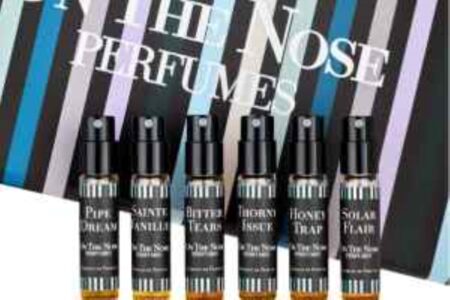
Thanks to perfumer Gabrielle Durand of On The Nose Perfumes. we have a draw for a registered reader that is USA-based (contiguous 48 states) for an On The Nose Perfumes Discovery Set that includes all 6 of her Core Collection extrait fragrances in box in 2 ml sample spray bottles. To enter the draw, you must be a registered reader.
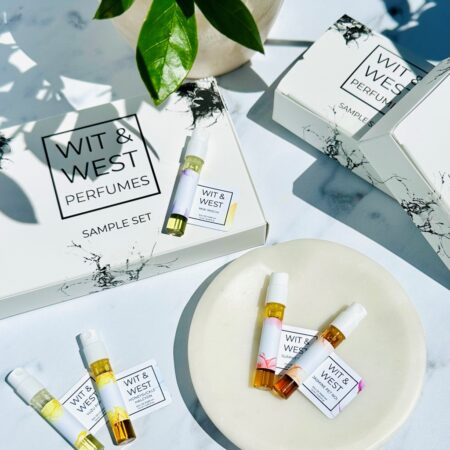
Grateful to Whitney Swales of Wit & West we have a Curated Sample Set w/5 Samples; 3 samples from the Reserve Collection (La Valse, Caldera Flower, and The Violetear), and 2 samples from the Cologne Collection (Yuzu Pop, and Fleur du Riad) + $50 Gift Card for a registered reader that is USA-based (contiguous 48 states).
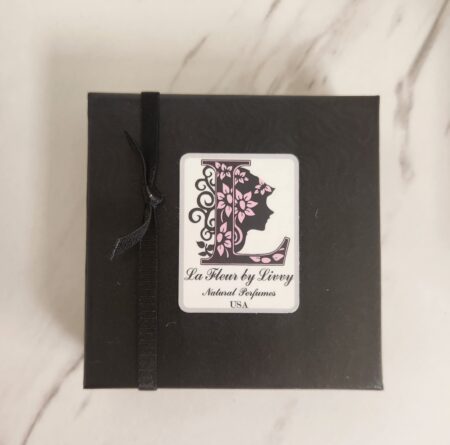
Thanks to Olivia Larsen we have a La Fleur by Livvy Explorer Set which includes six 2 ml samples: Puck’s Potion, White Lotus, Havana, Forbidden Love, Kupaloke, A Parisian Affair for a registered reader that is USA-based (contiguous 48 states)
To be eligible, please leave a comment with what you learned from our Next Gen Natural Perfumers, your opinion on Natural Perfumery and which quotes you found fascinating. There is one winner. Giveaway is for all three and ends August 3, 2025
This is our Privacy Policy.
Follow us on Instagram @cafleurebonofficial @witandwest @lafleurbylivvy @onthenoseperfumes
We announce the winners only on our site and on our Facebook page, so like Çafleurebon and use our blog feed…or your dream prize will be just spilled perfume.
